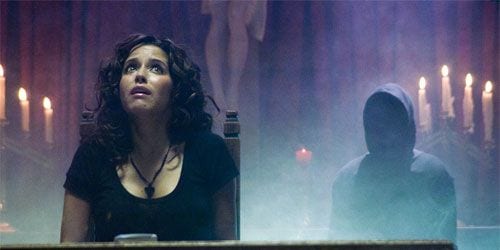
Any dead people call, we’re not home.
— Beth (Shannyn Sossamon)
What is Ed Burns up to? Not so long ago, he was the hopeful first-time director, anointed by Sundance for The Brothers McMullen (1995), then one of the cool kids in Saving Private Ryan (1998). Now he’s schlepping through horror-remake muck (not to mention romantic comedy muck, a.k.a. 27 Dresses), looking earnest enough and pained too, but not nearly so pained as the rest of us.
In One Missed Call (based on Takashi Miike’s Chakushin Ari [2003]), Burns plays a detective named Jack. He stumbles into a seeming serial murder case, where victims get phone calls from themselves in the future, the date and time emblazoned on their cell phone screens as they listen to their own terrified screams. In part, this is a function of current technology — if the future couldn’t be denoted on the message screen, no one would know he was destined to die two days hence. (Truth be told, this techy premise is inexact, as the message demands a missed call: even if a victim answers the call, it’s a missed call, so said victim can fret about it until the appointed hour.) The primary victims are pretty college students, selected for no reason except their numbers are in each other’s cells: as the scheme becomes apparent, they can become increasingly fearful, unable to stop their own horrific fates.
First up: Shelley (Meagan Good — is it even worth mentioning she’s the only black actor in the film?). “Studying” by an immaculately landscaped pool, attended by her exotic cat, she’s blithely unaware of the grisly end that you anticipate with something less than interest, though she appears slightly unnerved by the creepy soundtrack music she’s not supposed to hear. Her death, abrupt and vaguely comic, goes mostly unnoticed by her classmates, who attend a party the night of her funeral. Her only “friend,” Leann (Azura Skye), is bothered enough to mention that she did go to the funeral (“It sucked”), but she’s also unable to read her own missed call as a sign — and promptly heads off to the scariest part of town so she can face long shadows and train tracks.
She does, however, does confide in Last Girl Beth (Shannyn Sossamon), in order that someone attends to the pattern that has yet to develop. Beth is aided in this deciphering by Jack, who enters the picture partly because he’s assigned to the case, but also because his sister is killed — off-screen, in the mountains on a hike. She has a cell phone issue as well, though it’s never quite clear how she knows Shelley or how their cells connect. Still, the sister’s body in a black zippered bag allows Jack a special movie moment, that is, an expression of anguish and irresistible curiosity shot from below, as he looks into her mottled and decaying mouth and spots a clue, to this supernatural killer’s identity, a round red hared candy. The moment of discovery is not a little creepy: Jack dons the requisite plastic examining glove (complete with slappy sound effects) and reaches in between her teeth, rigamortis granting the usual clacky, sucky noises). Clarice Starling, he’s not, but Jack is shaken enough by the experience to believe Beth when she shows up with wild-seeming stories of missed calls and dead friends.
It doesn’t help that a TV producer (Ray Wise, forever Laura Palmer’s father) hears of these hijinks and shows up in search of a reality star. His show, American Miracles, offers a not-unclever satire on several fronts, his inspiration his own child’s possession and his star a designer-suited exorcist (Jason Beghe). The taping of a victim’s grisly death (in a church, no less) doesn’t go off quite as planned (like, she was supposed to survive), and so the producer is quickly shuffled off-screen and that plot point dropped. That’s too bad, as this means the movie must return to its more run-of-the-mill slasher structure, with victims lined up for annihilation.
Jack is appropriately puzzled by all this business — especially Beth’s part in it — but, given the hard fact of his sister’s corpse, he is less instantly dismissive than his partner, Mickey (Margaret Cho, looking pained enough for all of us). He persuades Beth to share her own story (“If you don’t talk to me, I can’t help you”), which introduces the theme of child abuse. Helpfully, Beth’s a psych major, which means she attends a lecture on post-traumatic stress in abused children (featuring the ungrammatical but maybe telling assessment: “The child may blame themselves for what happened”) and also harbors her own bad memories. Flashbacks show her as a child (Alana Locke), weeping as her mother (Laura Harring, not looking pained, exactly, but still…) burns her with cigarettes and calls her a “crybaby.”
On hearing this terrible tale of the bad mom, Jack again responds appropriately, holding sad Beth’s head to his chest. But, as Beth has received her own missed call (or missed it, I suppose, depending on how you parse all these numinous events), they have work to do: she goes to the library and he goes… somewhere else. The point is, they’re positioned to have a phone conversation, in which Beth figures out the plot as far as anyone will. First, she finds the name of a trauma victim associated with a fire at a children’s hospital (there’s always a fire and there’s always a hospital in such plots). And then, bless her, she poses the answer as a question: “What if her spirit’s still there, moving through the phone, attacking people?” Well, of course!

![Call for Papers: All Things Reconsidered [MUSIC] May-August 2024](https://www.popmatters.com/wp-content/uploads/2024/04/all-things-reconsidered-call-music-may-2024-720x380.jpg)



